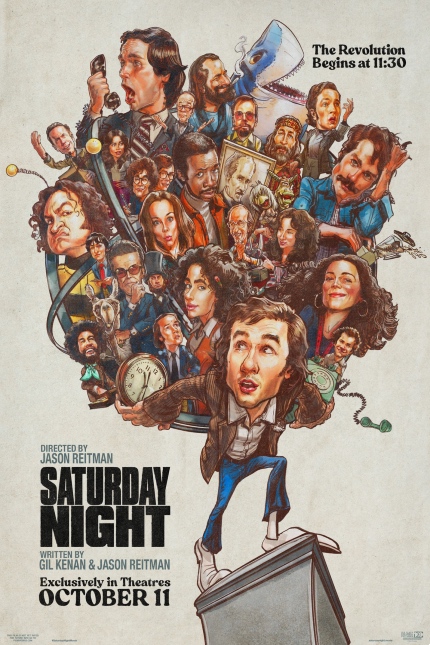SATURDAY NIGHT Review: Jason Reitman Gives SNL the Hagiographic Treatment

For pre-cable or Internet audiences of a certain vintage and generation, the arrival of a late-night, weekly sketch comedy show, Saturday Night (Live), represented keenly subversive, self-aware, comically absurdist counter-cultural programming.
It was the last, sustained gasp of one generation’s rebellion against societal norms, as a majority of the country’s voters supported a counter-counter-revolution that first brought Richard M. Nixon to the White House and – after a four-year reprieve provided by the post-Watergate election of Jimmy Carter – 12 years of Ronald Reagan and George Bush and their reactionary, right-wing policies.
Saturday Night Live long ago gave away whatever right it had to call itself subversive, functioning primarily as a training ground for successive waves of up-and-coming comedians (many of whom, in time, become the opposite). Excluding summers, week in and week out Saturday Night Live remains on the air, reminding nostalgic Baby Boomers and Gen X’ers of what once was and will never be again new, novel, and original.
Inexplicably moved by mid-70s nostalgia, Jason Reitman (Ghostbusters: Afterlife, The Front Runner, Tully) felt compelled to co-write and direct a highly fictionalized, overly dramatized version of the make-or-break night that brought unsuspecting viewers across the country the first episode of Saturday Night Live (called just “Saturday Night” at the time due to rights issues), drawing on an obviously deep appreciation of Aaron Sorkin’s approach to storytelling (long-winded dialogue scenes, walk-and-talks, low-stakes-pretending-to-be-high-stakes) to craft an engagingly pleasant, surface-deep simulation of that first night.
With a cast of dozens, if not hundreds (including crew) involved in the making of a studio production like Saturday Night Live, Reitman settled on uber-producer/co-creator Lorne Michaels (Gabriel LaBelle, The Fabelmans) for his viewpoint character. A whirlwind of frenetic energy, occasional self-doubt, and ambition as tall and wide as 30 Rockefeller Center, Michaels winds and wends his way through the labyrinthine corridors of Studio 8H and its surrounding offices and floors, navigating conflicting personalities among cast and crew, his partner-in-show-making, Dick Ebersol (Cooper Hoffman), a studio rep with potentially nefarious intention, Dave Tebet (Willem Dafoe), and a virtual ticking clock: the 90 minutes before the first episode begins to air across the country.
While Tebet ultimately holds the key (i.e., the power) to nix the first episode altogether, instead airing a Johnny Carson rerun, Michaels flits from Rosie Shuster (Rachel Sennott), his future ex-wife/current staff writer, Chevy Chase (Cory Michael Smith), a talented egomaniac and one-season wonder, Dan Aykroyd (Dylan O'Brien), a next-level talker and improviser, to John Belushi (Matt Wood), a surely gifted, obviously troubled comic actor. Running plotlines involve Chase already looking for his next gig, Rosie and Ackroyd’s casually romantic relationship, Belushi’s ongoing refusal to sign his contract, head writer Michael O'Donoghue (Tommy Dewey) refusal to bend to the network censor’s demands, and Garrett Morris (Lamorne Morris), the only non-white actor in the cast, struggles to define himself and his contributions to the show.
Those mostly male-centric plotlines give Gilda Radner (Ella Hunt), Laraine Newman (Emily Fairn), and Jane Curtin (Kim Matula), each one a key member of the Not Ready For Primetime Players, almost nothing to do except react to the ongoing chaos around them or service the egos of various male members of the cast and crew. It’s a shame, especially as Hunt, Fairn, and Matula otherwise deliver reasonably acceptable performances as stand-ins for their real-world counterparts.
Their characters deserved not just better development, but independent arcs of their own. The glimpses we do so of Radner, Newman, and Curtin, however, suggest an entirely different film could – and maybe should – have been made from their perspective. It still can be.
As things stand, Saturday Night remains resolutely focused, almost to a fault, on Lorne Michaels and his journey to bring the first precious episode to air. The camera almost never leaves Michaels, tracking, trailing, and borderline stalking him as he walks, talks, and eventually decides what sketches and bits will go and what won’t from twice the needed material.
To artificially heighten tension as the clock winds down toward the expected 11:30 p.m. EST start time, Reitman studiously avoids traditional editing techniques, instead filming dialogue scenes as oners (one-scene master shots) or whip panning from one character to another as they talk excitedly at each other in hallways, elevators, and offices.
Reitman and co-writer Gil Kenan’s screenplay give Michaels that vision/visionary thing: even though he can’t initially summarize or define his show to a highly dubious Tebet, the audience implicitly knows Michaels will get that eureka moment seconds before Tebet has to give the show a yay or nay and create an alternate timeline without Saturday Night Live. When he does, everyone, including the tech crew in the studio, nod their heads approvingly, secure in the knowledge of the foresight and wisdom in Michaels’ words.
Properly roused and energized, the show does, in fact, go on, history made, and the next fifty plus years set into motion, the audience entertained, if not exactly wiser or enlightened before the end credits roll on a nearly two-hour film.
Saturday Night opens Friday, October 11, only in movie theaters, via Sony Pictures Releasing.







